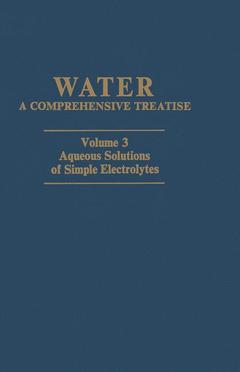Aqueous Solutions of Simple Electrolytes, Softcover reprint of the original 1st ed. 1973 Water Series
Langue : Anglais
Auteur : Franks Felix

The chapters making up this volume had originally been planned to form part of a single volume covering solid hydrates and aqueous solutions of simple molecules and ions. However, during the preparation of the manu scripts it became apparent that such a volume would turn out to be very unwieldy and I reluctantly decided to recommend the publication of sepa rate volumes. The most sensible way of dividing the subject matter seemed to lie in the separation of simple ionic solutions. The emphasis in the present volume is placed on ion-solvent effects, since a number of excellent texts cover the more general aspects of electrolyte solutions, based on the classical theories of Debye, Huckel, On sager, and Fuoss. It is interesting to speculate as to when a theory becomes "classical." Perhaps this occurs when it has become well known, well liked, and much adapted. The above-mentioned theories of ionic equilibria and transport certainly fulfill these criteria. There comes a time when the refinements and modifications can no longer be related to physical significance and can no longer hide the fact that certain fundamental assumptions made in the development of the theory are untenable, especially in the light of information obtained from the application of sophisticated molecular and thermodynamic techniques.
1 Thermodynamics of Ion Hydration.- 1. The Thermodynamic Theory of Solvation.- 2. Molecular Interpretation.- 3. Hydration of Gaseous Ions.- 4. Other Thermodynamic Properties of Ions at Infinite Dilution in Water.- 5. Solvent-Isotope Effect in Hydration.- 6. Reference Solvents.- 7. Ionic Hydration and Excess Properties.- 2 Thermodynamics of Aqueous Mixed Electrolytes.- 1. Introduction.- 2. Theoretical Framework.- 3. Experimental Techniques.- 4. Experimental Results and Discussion.- 3 Hydration Effects and Acid-Base Equilibria.- 1. Ionization of Liquid Water.- 2. Hydration of H+ and OH?.- 3. Organic Acids and Bases in Aqueous Solution.- 4 Ionic Transport in Water and Mixed Aqueous Solvents.- 1. Introduction.- 2. Measurement.- 3. Limiting Ionic Conductances in Binary Solutions.- 4. Mechanism of Ionic Conductance.- 5. Limiting Ionic Conductance in Aqueous Solvent Mixtures.- 5 Infrared Spectroscopy of Aqueous Electrolyte Solutions.- 1. Introduction.- 2. Information on Aqueous Ionic Solutions Obtainable from Infrared Analysis.- 3. Experimental Methods.- 4. Critical Review of Available Infrared Data.- 5. Conclusion.- 6 Raman Spectroscopy of Aqueous Electrolyte Solutions.- 1. Discussion.- 2. Raman Bands Arising from Solutes.- 3. Raman Bands Arising from the Solvent: Liquid Water.- 4. Addendum.- 7 Nuclear Magnetic Relaxation Spectroscopy.- 1. Introduction.- 2. Nuclear Magnetic Relaxation.- 8 Dielectric Properties.- 1. Basic Theory.- 2. Experimental Methods.- 3. Characteristic Quantities Derived from Complex Permittivity Measurements.- 4. Information from the “Static” Permittivity.- 5. Information Obtainable from the Dielectric Relaxation Time with the Help of the Proton Magnetic Relaxation Rate.- 6. The Influence of Small Cations on the Dielectric Relaxation Time.- 7.Summary.- References.- Compound Index.- Formula Index.
Date de parution : 07-2012
Ouvrage de 472 p.
Thème d’Aqueous Solutions of Simple Electrolytes :
Mots-clés :
Absorption; Diffusion; Sorption; development; electrolyte; enthalpy; entropy; information; isotope; metals; molecule; spectroscopy; structure; thermodynamics; transport
© 2024 LAVOISIER S.A.S.



